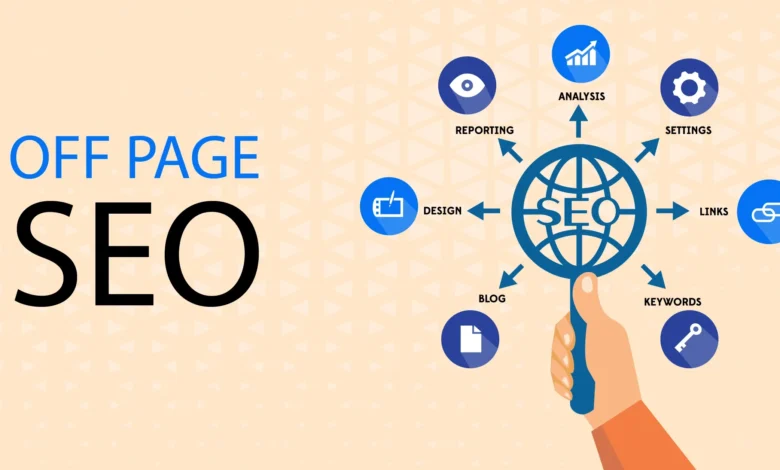Off-Page SEO: Exploring the Latent Potential for Your Website and Boosting Your Rankings

In the rapidly changing context of digital marketing, SEO is an indispensable tool in promoting sites for natural Keynesian traffic. People are well conversant with and use on-page SEO, which encompasses tweaking your website’s content and layout, but the same cannot be said for off-page SEO. Off-page SEO means all the activities conducted in the context of search engine optimization beyond the given website. This paper discusses the various types of off-page SEO, their importance, and how you can maximize off-page SEO to improve your standings online.
Understanding Off-Page SEO
As the name suggests, off-page optimization refers to the company’s efforts outside one’s website to improve its results in SERPS or Search engine result pages. Off-page SEO differs from on-page SEO since while the latter deals with internal factors of the website, off-page involves external features. Such elements are backlinking, social media marketing, influencer targeting, and ORM or online reputation management. The off-page SEO strives to build a favorable opinion of your website in the context of the search engine results and visitors.
What is Off-Page SEO?
Modern search engines such as Google analyze many factors to decide what sites are relevant and authoritative. Although keywords used on the page, quality of content, etc., play a significant role in these algorithms, off-link factors play a more substantial role. Quality backlinks from authoritative websites, positive sentiments on your social media platforms, and a good reputation online tell the search engines that your website is worthy. This results in better rankings, increased organic traffic, and better placement in the SERPs.
Key Off-Page SEO Strategies
1. Backlinking
Link building or back-linking is the pillar of off-page SEO. This means it refers to obtaining links on other people’s websites that lead to your site. These backlinks serve as recommendations that point to the fact that your content is genuine and should be of value. However, not all the links pointing to a website are of the same value or are equal in quality. It is better to have fewer high-quality tools than to have a lot of low-quality tools. External links originating from possibly reliable, sufficiently specialized Websites add more value to the site and can significantly lift its ranking. The methods of getting quality backlinks are:
- Guest blogging.
- Making quality content that can be shared.
- Partnering with influential personalities in the industry.
2. Social Media Engagement
Off-page SEO is best done using social media since they effectively market products and services. A page on Facebook, Twitter, Linked In, and Instagram, among others, can give your website good traffic and visibility. That is why using your content on social media, engaging in industry conversations, and promoting social sharing help improve your standings. Moreover, likes, shares, and comments affect your ranking indirectly, as they show increased attendance and users’ activity on the site.
3. Influencer Outreach
Strategies Off-Page SEO can be expanded using influence marketers in your industry. Because influencers have earned the trust and the audience’s loyalty, their recommendations are worth a lot. When people register their accounts for networking, they are given opportunities to share their content, products, and services, which other users can access; this is an excellent way of getting backlinks and reaching out to many people as the influencers promote the accounts. Influencer marketing can be of many types, such as guest posts, social media advertisements, and product endorsements.
4. Online Reputation Management
Off-page SEO significantly relies on the image you put to the public and should be handled carefully. An exemplary fact is that search engines consider the general sentiment and image of the brand while ranking the websites. Ask happy clients to write favorable reviews on the firm’s pages in Google My Business, Yelp, Trustpilot, and other pertinent platforms. Central negative reviews should be handled professionally and promptly to show the customers their importance. It is well-known that online reputation improves your ranking on the search engine and helps establish trust between you and the consumers.
5. Content Marketing
Off-page SEO involves producing high-quality, shareable content. This strategy includes creating helpful articles, blog posts, infographics, videos, and other content your target audience would appreciate. When you post helpful and engaging content, please remember: “Other websites will be willing to link to it, thus developing the backlink profile. Also, anyone with access to something they like can share your content on social media, reach more people, get traffic to your site, and boost your online status.
Measuring Off-Page SEO Success
Therefore, several off-page SEO factors can help analyze the campaigns’ effectiveness. The options are backlinks, quantity, and quality, which are believed to be highly influencing the site’s performance and social activity, such as the number of likes, shares, comments, ratings, reviews from other sites, and referring traffic from different sites. Google Analytics and other off-page SEO tools such as Ahrefs, Moz, SEMrush, and others can present off-page SEO results. The advantage of reviewing these metrics is that they enable you to tweak your strategies and thus have improved outcomes.
Conclusion
Off-page SEO is a significant element of any SEO plan. One can improve their website’s overall rank and traffic by paying attention to link building, participation in social networks, involving influential people, reputation management, and applying share triggers. Off-page SEO, especially link building, is a continuous process that needs proper planning; however, the benefits, namely, higher SERP rankings, boosted organic traffic, and better recognition compensate for the efforts. Off-page SEO should be accepted as one of the most effective strategies for raising the popularity of your website and creating a solid online presence.



